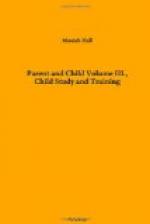The school, therefore, may teach better than any other agency the habits and ideals of duty, social service, justice and patriotism. It also teaches frequently better than does the home, the habits of obedience, punctuality, regularity and industry.
A secondary purpose of the school is to assist the home to develop in the child the physical, mental, moral and social habits and ideals to which we have referred in previous lessons. To the shame of the home, it must be said that the school is accomplishing its particular function far better than is the home. The school rarely fails to exact obedience, regularity, punctuality, and industry from the pupil; the home, on the other hand, frequently fails to train children in these habits because of the softness and vacillation of the parents. The school trains to proper habits of hygiene and sanitation, and is often under the necessity of acquainting parents with physical defects in their children which too often they have overlooked.
Moreover, the school, as a larger social unit than the home, has some distinct advantages over the latter: It can teach the obstinate, quarrelsome child better than can the home the necessity of adjusting his conduct to the requirements of the social group with which he associates. In school, frequently for the first time, a child learns what is meant by the ideals of duty and justice; furthermore, he is usually trained to habits of industry, perseverance and self-control which the home too often is not well prepared to teach.
The home, however, is far more important than is the school; the latter might be abolished and some other form of education adopted by society without calamitous results; but if the home were suddenly abolished, it is probable that civilization itself would be shaken to its center, if not destroyed. The home, therefore, ought to be better prepared and equipped to fulfill its function than is the school; but not one parent in a thousand is specially prepared for the duties of parenthood. The teacher, on the other hand, is required to spend years in preparation for his work. He is expected, moreover, to set a worthy example for children to follow. “As the teacher so the school,” is a maxim that has stood the test.




